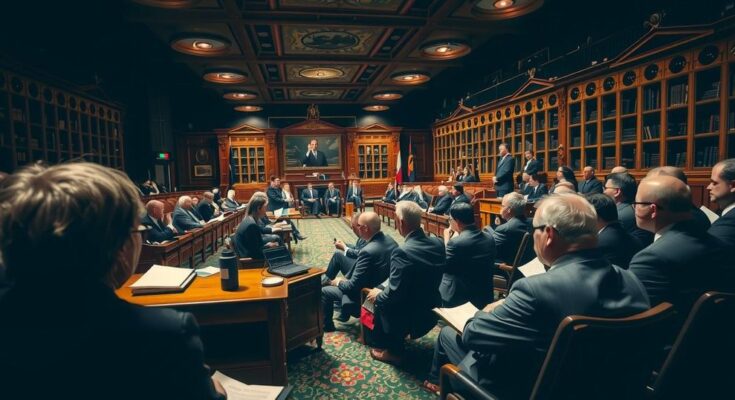Lord Howard advocates for a reform of the Human Rights Act, claiming it undermines parliamentary authority by shifting power to the judiciary. A report by Policy Exchange illustrates how the Act has hindered government action on issues like criminal justice and asylum, calling attention to alarming legal cases. The debate intensifies as legal experts critique the Act’s impact on English law and civil liberties.
Lord Howard has called for significant reforms to the Human Rights Act, asserting that it has diminished parliamentary sovereignty by shifting power towards the judiciary. In a provocative foreword to a Policy Exchange report, he highlights 25 legal cases that illustrate how the Act has thwarted the government’s ability to protect public interests, drawing attention to rulings that undermine victims’ rights and hinder law enforcement. Among the cited offenses, one case saw the police barred from entering a convicted paedophile’s home to monitor his internet use, illustrating a troubling trend of judicial overreach. The report also condemns decisions that have crippled the UK’s asylum framework, emphasizing a Supreme Court ruling that prevented the deportation of a violent criminal to Zimbabwe due to health care inadequacies there. It underscores the Act’s chilling effect on press freedom, where media outlets were restricted from reporting investigations into serious crimes, highlighting a stark shift in legal interpretations that once upheld open discourse. Moreover, the document argues that the Human Rights Act has created barriers against effectively prosecuting protesters obstructing public spaces and has complicated laws related to the cross-examination of rape victims, as well as the indefinite detention of foreign terror suspects. Lord Howard emphasized the pivotal need for reform, stressing how the Act has widened the gap between legislative intent and judicial interpretation. Authored by legal luminaries such as Professor Richard Ekins and Sir Stephen Laws, the report is reinforced by voices like Sir Patrick Elias, who declares that the Act’s influence has regrettably skewed the trajectory of English law. Similarly, Lord Wolfson praised the analysis for pushing the debate beyond mere rhetoric and urging a serious examination of the implications of human rights legislation.
The Human Rights Act, enacted under Tony Blair’s government, was designed to ensure that individual rights are safeguarded in the UK. However, it has recently come under scrutiny from various political figures and legal scholars who argue that it has led to a substantial shift of influence from Parliament to the judiciary. The debate centers around whether the Act actually protects citizens or undermines government authority and legislative intent, particularly in critical areas like criminal justice, press freedoms, and immigration control. This discourse gains greater urgency with the release of a new report from Policy Exchange, which details cases illustrating the Act’s contentious impact on the rule of law.
In conclusion, Lord Howard’s call for reform of the Human Rights Act underscores a growing sentiment among legal experts and politicians that the balance of power must be restored to Parliament. The Policy Exchange report provides compelling evidence that the Act has led to judicial overreach, hampering the government’s ability to protect its citizens effectively. As discussions surrounding the future of human rights legislation evolve, it is evident that a thorough re-evaluation of its implications is necessary to align it with the principles of democracy and justice.
Original Source: www.telegraph.co.uk



